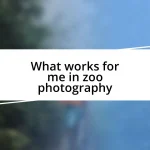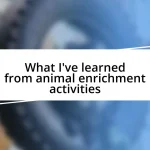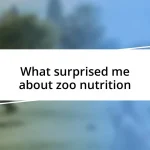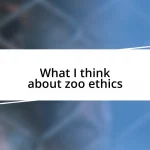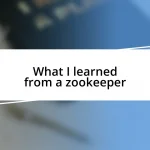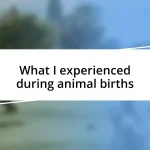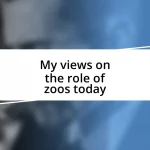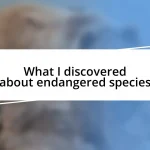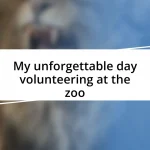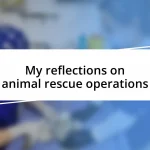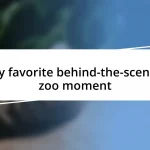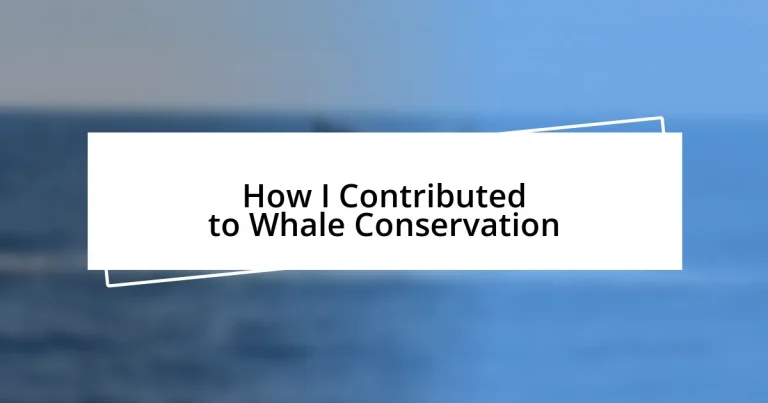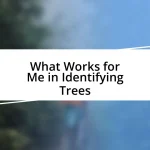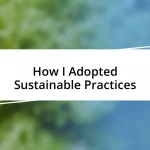Key takeaways:
- Whales play a crucial role in carbon cycling and indicate ocean health, highlighting the importance of their conservation for both marine ecosystems and climate change.
- Personal experiences, such as witnessing whale behavior and participating in beach clean-ups, foster a deeper emotional connection and drive advocacy efforts for whale protection.
- Involvement with conservation organizations enhances understanding of marine ecology and allows for hands-on contributions, such as research and community engagement.
- Advocacy and education through community efforts and online sharing inspire collective action, crucial for creating lasting impacts in whale conservation.
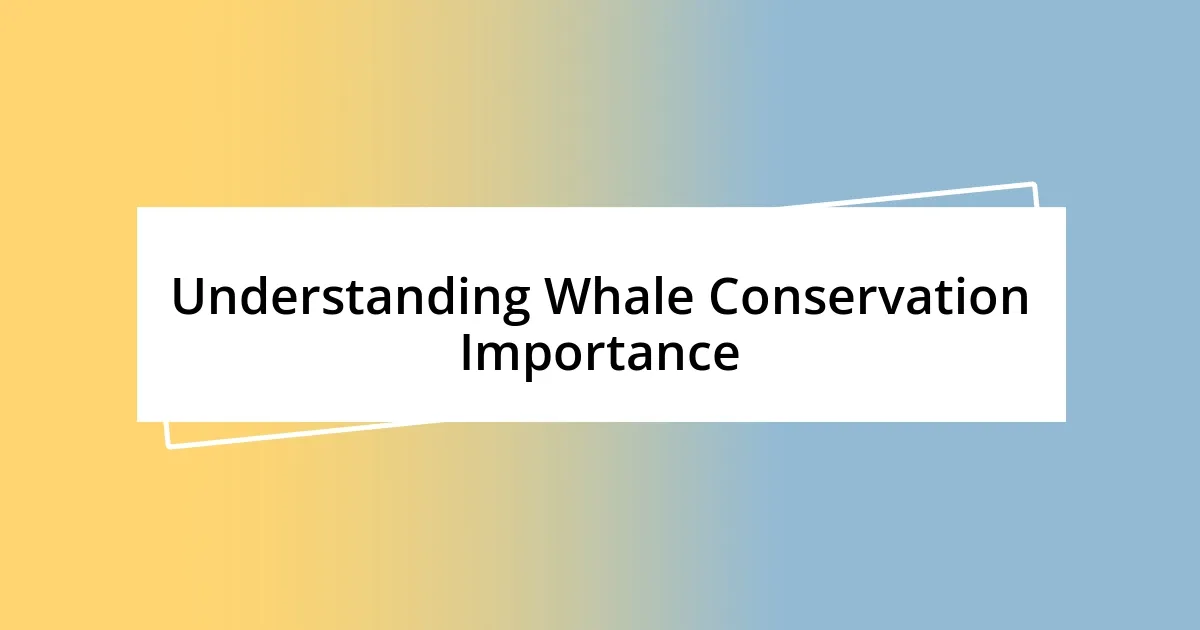
Understanding Whale Conservation Importance
Whale conservation is crucial not only for the survival of these magnificent creatures but also for maintaining the health of marine ecosystems. When I first learned about the role whales play in carbon cycling, I was struck by the realization that their decline could significantly impact climate change. Who knew that these gentle giants were also vital players in regulating our planet’s atmosphere?
I recall attending a marine biology seminar where a passionate speaker shared stories about the emotional connections humans have with whales. Hearing about the songs of humpback whales reverberating through the ocean gave me chills. It made me wonder: if these animals can evoke such deep feelings within us, what would our oceans look like without them?
Moreover, whales are indicators of ocean health. When I volunteered on a marine research project, we saw firsthand how fluctuations in whale populations reflected changes in the broader marine ecosystem. It was a vivid reminder that by protecting whales, we are also safeguarding the intricate balance of life in our oceans, which in turn affects every species—us included.
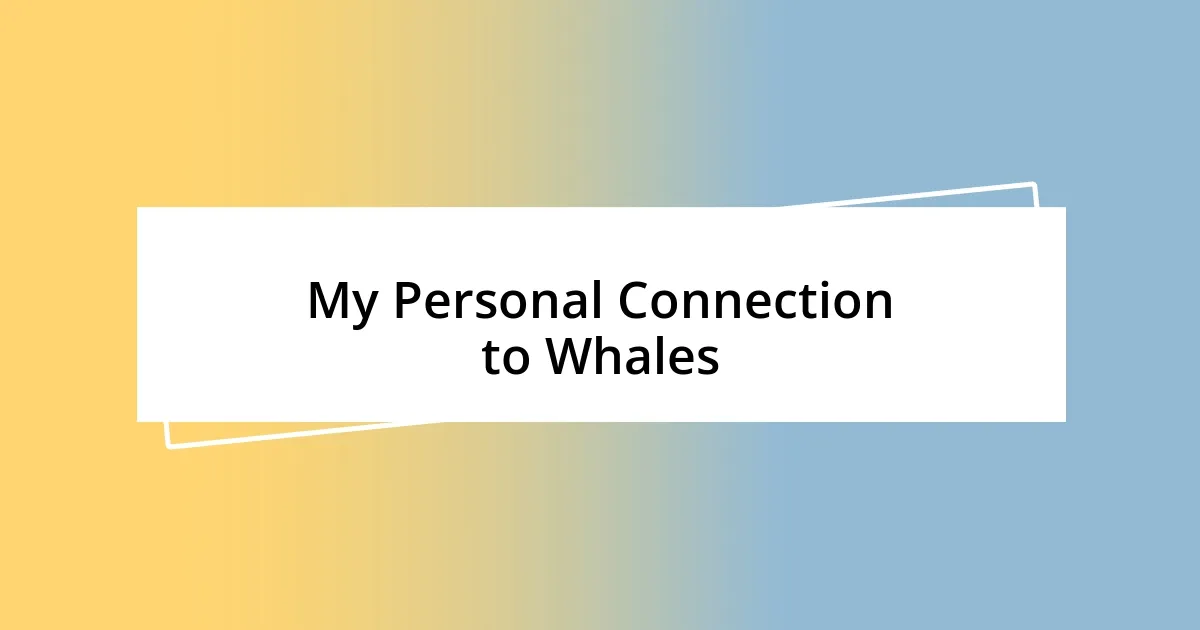
My Personal Connection to Whales
I remember the first time I saw a whale breaching the surface during a boat tour. The immense size and grace of that creature left me in awe, a moment etched in my memory. I felt an indescribable connection to something so ancient and wise. It was as if I was witnessing a sentinel of the sea, reminding me of our shared responsibility to protect their world.
On another occasion, I volunteered with a team conducting beach clean-ups to prevent plastic pollution from affecting marine life. While sorting through trash, I came across a plastic bag, and it hit me hard to think of whales mistaking it for food. This personal experience ignited a passion within me to advocate for their conservation. I realized that every small effort counts in the larger fight against the threats they face.
I find it fascinating how whales communicate through complex songs, similar to how we share stories. When I hear about their songs, it evokes a sense of kinship, as if we’re not so different after all. This emotional bond drives me to engage others in climate activism, knowing that our voices can amplify the plight of these magnificent beings.
| Experience | Emotional Insight |
|---|---|
| Saw a whale breaching | Awe and connection |
| Volunteered for beach clean-ups | Passion for conservation |
| Learned about whale songs | Kinship and advocacy |
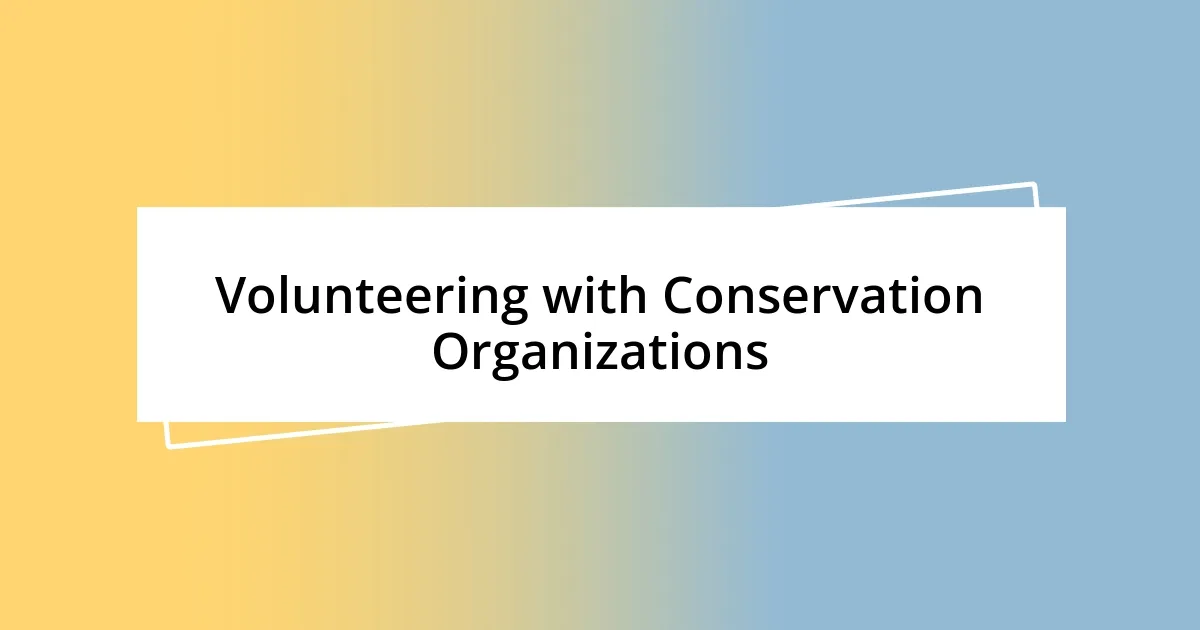
Volunteering with Conservation Organizations
Working alongside conservation organizations has been one of the most enriching experiences in my journey toward whale conservation. I cannot emphasize enough the hands-on impact these experiences have had on me, fostering a deeper understanding of marine ecology. One particularly memorable day involved participating in a tagging project where we carefully placed satellite trackers on humpback whales. Witnessing the meticulous process revealed the complexities of studying these creatures and the respect required to ensure their safety.
Moreover, the camaraderie built with fellow volunteers was inspiring. I remember sharing meals and stories about our passion for conservation, which really cemented a sense of community. Here are some key ways volunteering with conservation organizations can contribute to whale conservation:
- Hands-on Research: Involvement in activities like data collection, tagging, and monitoring whale populations.
- Education and Outreach: Engaging local communities through workshops and events to raise awareness about the importance of whale conservation.
- Direct Action Projects: Participating in beach clean-ups and coastal restoration to protect whale habitats from pollution.
- Networking with Experts: Learning from marine biologists and researchers, enhancing understanding of whale biology and ecology.
Every moment spent with these organizations solidified my commitment to advocacy and inspired me to spread awareness beyond my immediate circle. Interacting with whales in their natural habitat deepened my passion, revealing not only their gracefulness but also the urgency for their protection.
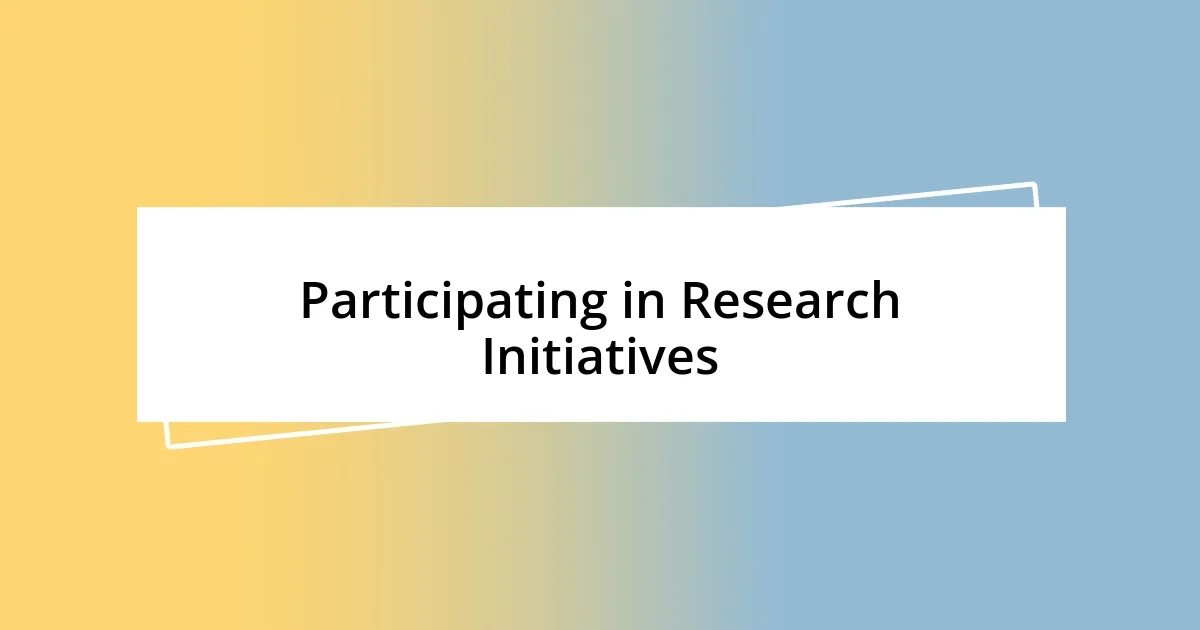
Participating in Research Initiatives
Contributing to research initiatives has been a game changer for my understanding of whale conservation. I recall a specific project where we analyzed acoustic recordings to study whale communication. Listening to those haunting songs made me realize just how intricate and meaningful their interactions are. Ever thought about how much we could learn from their sounds? It struck me that every frequency might hold secrets about their behaviors and social structures.
Another time, I participated in a photo-identification study, which involved cataloging the unique markings on tail fins. The thrill of spotting a familiar whale we had previously documented was exhilarating! It felt like reconnecting with an old friend who had shared stories of their travels. This direct involvement underscored the importance of individual whales in the population—each one with its own story and identity, ensuring their voices are recognized and protected.
Throughout my experience, collaborating with researchers reinforced the idea that science is a collaborative effort. I often found myself in deep conversations with marine biologists, exploring everything from migration patterns to environmental threats. Who knew that sharing a lunch break could lead to such profound insights? These interactions have fueled my passion for advocacy, making me eager to share what I’ve learned and inspire others to get involved in whale conservation efforts.
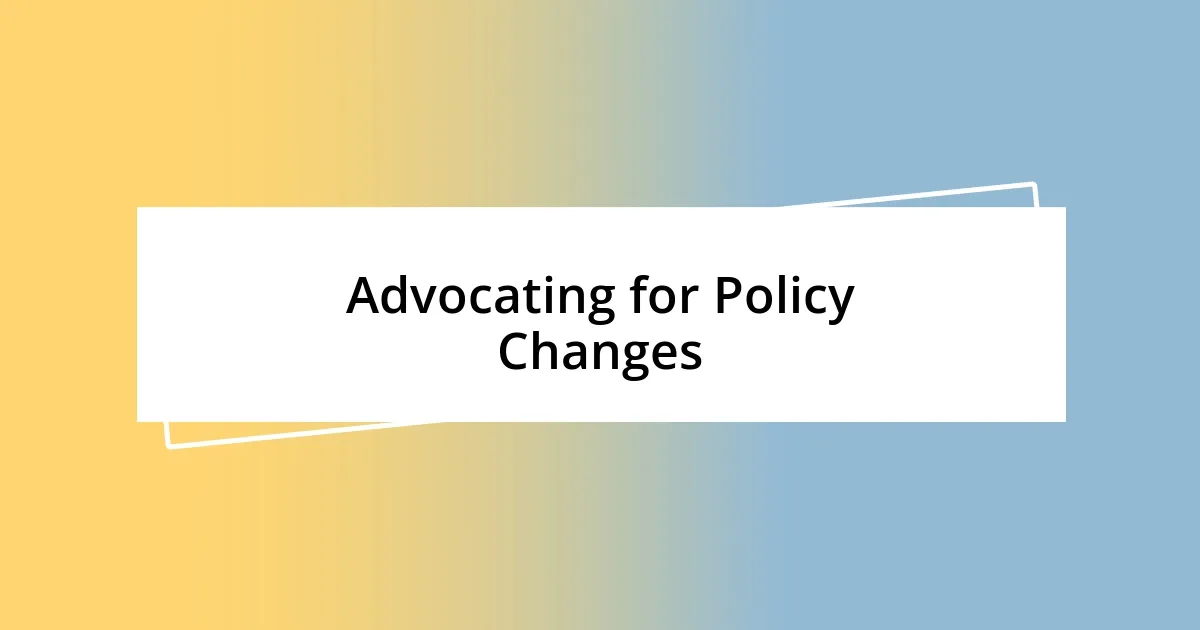
Advocating for Policy Changes
Advocating for policy changes in whale conservation is a vital aspect of my efforts. I remember attending a local town hall meeting where I stood up to speak about the importance of protecting our marine ecosystems. The nervousness I felt transformed into a sense of empowerment when I noticed how attentive people were. It became clear to me that, by sharing my knowledge and experience, I could influence others to understand the urgency of enacting supportive legislation.
Another memorable experience was collaborating with a coalition of environmentalists to draft a policy proposal aimed at limiting fishing practices harmful to whales. I often questioned whether my voice would matter, yet the excitement in the room as we brainstormed solutions left me inspired. Together, we highlighted the potential repercussions of unsustainable fishing on whale populations, crafting recommendations that not only called for stricter regulations but also proposed alternative fishing methods that would benefit both marine life and local fisheries.
By mobilizing community support for these policies, I’ve witnessed firsthand how advocacy can unite people around a common cause. One time, I helped organize a letter-writing campaign to urge our representatives to support the Marine Mammal Protection Act. The thrill of receiving responses from constituents who felt equally passionate invigorated my belief that change was possible. It’s through these collective efforts that we can create lasting impacts for the future of whales and their habitats.
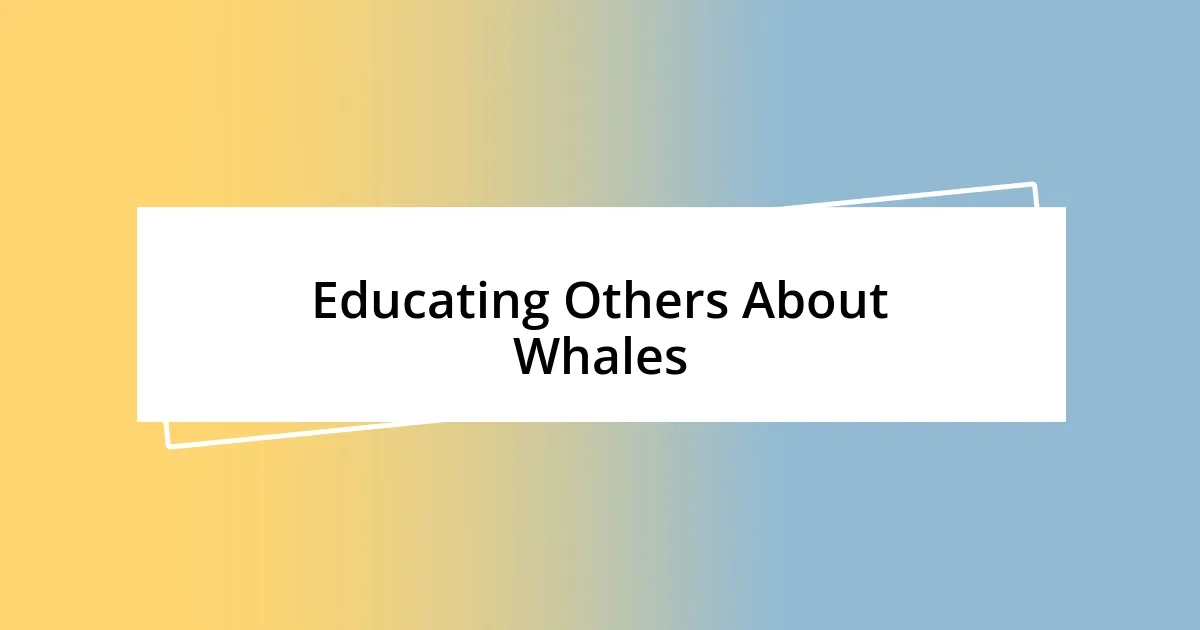
Educating Others About Whales
Educating others about whales has been one of the most rewarding aspects of my journey in conservation. I vividly remember a workshop I conducted for local students, where I brought in videos of whales breaching. The awe on their faces was priceless! It made me realize that sometimes, it just takes a captivating visual to ignite a spark of curiosity. Have you ever seen the expression of wonder in a child’s eyes when they encounter something new? That moment fueled my desire to continue educating others—after all, understanding leads to caring.
I also enjoy engaging with my community through social media platforms. One time, I shared a post detailing the migratory patterns of humpback whales and how climate change affects their routes. The comments section exploded with questions, revealing a thirst for knowledge I hadn’t anticipated. It’s fascinating to witness how online discussions can bridge gaps, connecting people from different backgrounds united by a common interest in marine life. When was the last time you felt inspired by a conversation online? Those moments remind me that education is not just about sharing facts; it’s about fostering a community passionate about whales.
Hosting local beach clean-ups has proved to be yet another effective way to educate others. While picking up debris, I often share anecdotes about how marine plastic impacts whale populations. The visceral connection between our actions on land and the ocean’s health always seems to resonate. I can still remember a participant’s reflection after learning that ingesting plastics could be fatal for these majestic creatures. That realization was a wake-up call for us all, wasn’t it? Together, we not only cleaned our beaches but also planted seeds of awareness, proving that small actions can lead to big changes in the way we think about and protect our oceans.
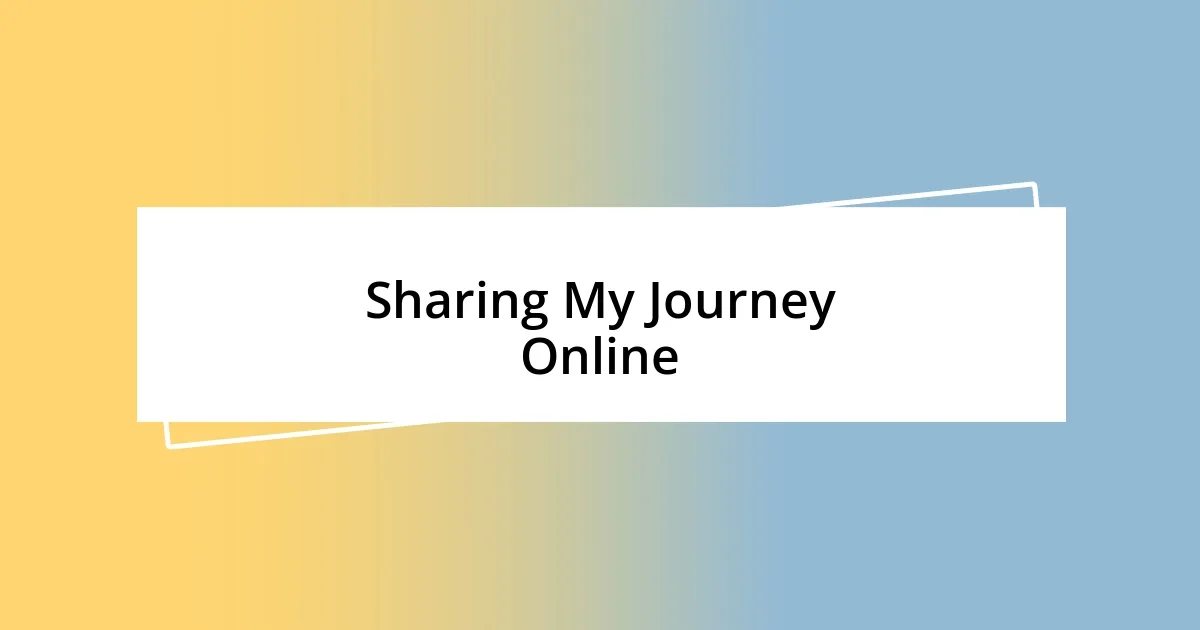
Sharing My Journey Online
Sharing my journey online has opened unexpected doors for connection and learning. I can’t forget the day I posted about my first whale-watching trip. The rush of excitement I felt when I spotted my first majestic blue whale took me back to that moment as I shared my experience. The flood of comments from fellow enthusiasts, recalling their own thrilling encounters, made me realize we all share a common thread—a deep love for these magnificent creatures. Isn’t it amazing how a single post can spark a wave of memories and conversations?
I’ve also embraced storytelling through platforms like Instagram and Facebook, where I share both triumphs and challenges in whale conservation. One particular post, featuring a heartwarming video of a mother whale and her calf, brought tears to my eyes. I expressed how witnessing such a bond reminded me of the fragility of whale populations. The shared emotions in the comments were palpable, and discussions flowed about ways we could collectively contribute to their preservation. Have you ever felt that connection with people you’ve never met? It’s like building a community centered around a shared passion that goes beyond words.
Through my blog, I’ve documented not just facts, but personal reflections, too. For instance, I recounted a poignant moment during a marine cleanup when I found a tangled fishing line. As I cut it away, I couldn’t shake the image of a whale struggling for freedom. That experience reinforced why I share my journey online; it’s about turning awareness into action. Isn’t it incredible how our stories can motivate others to see the bigger picture? Every post becomes a part of a larger conversation, encouraging us all to take part in protecting our oceans and the life within them.
